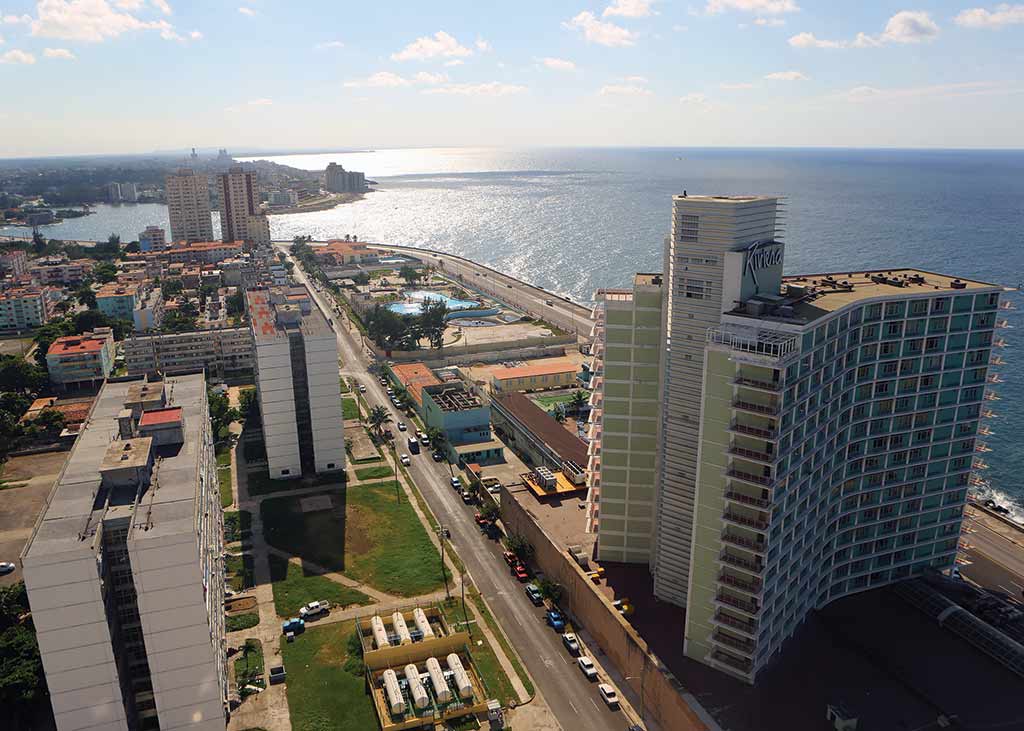The Malecón runs along the bulging, wave-battered shorefront of northern Vedado, curling from La Rampa in the east to the Río Almendares in the west, a distance of three miles. The sidewalk is pitted underfoot, but a stroll its full length makes for good exercise while taking in such sights as the Monumento Calixto García (Malecón y Av. de los Presidentes), featuring a bronze figure of the 19th-century rebel general on horseback; the Hotel Habana Riviera (Malecón y Paseo), opened by the Mafia in 1958 and recently remodeled to show off its spectacular modernist lobby; and the Torreón de Santa Dorotea de la Luna de la Chorrera (Malecón y Calle 20), a small fortress built in 1762 to guard the mouth of the Río Almendares. Immediately beyond “La Chorrera,” the Restaurante 1830 features a Gaudí-esque garden that includes a dramatic cupola and a tiny island—Isla Japonesa—in Japanese style.

Mobster Meyer Lansky’s Hotel Habana Riviera. Photo © Christopher P. Baker.
The elaborately detailed, Spanish-style hotel was greatly in need of refurbishment when, in 1955, mobster Meyer Lansky persuaded General Batista to let him build a grand casino. Luminaries from Winston Churchill and the Prince of Wales to Marlon Brando have laid their heads here, as attested by the photos in the bar. It is still the preferred hotel for visiting bigwigs.
Beyond the Palladian porch, the vestibule is lavishly adorned with Mudejar patterned tiles. The sweeping palm-shaded lawns to the rear—the terrace bar is a de rigueur spot to enjoy a mojito and cigar—slope toward the Malecón, above which sits a battery of cannons from the independence wars. The cliff is riddled with defensive tunnels built since the 1970s.
The modernist Hotel Capri (Calles 21 y N) was built in 1958 by the American gangster Santo Trafficante and was a setting in the movie The Godfather and Soy Cuba.
The Monumento a las Víctimas del Maine (Maine Monument, Malecón y Calle 17) was dedicated by the republican Cuban government to the memory of the 260 sailors who died when the USS Maine exploded in Havana harbor in 1898, creating a prelude for U.S. intervention in the War of Independence. Two rusting cannons tethered by chains from the ship’s anchor are laid out beneath 12-meter-tall Corinthian columns dedicated in 1925 and originally topped by an eagle with wings spread wide. Immediately after the failed Bay of Pigs invasion in 1960, a mob toppled the eagle—its body is now in the Museo de la Ciudad de la Habana, while the head hangs on the wall of the cafeteria in the U.S. Interests Section. The Castro government later dedicated a plaque that reads, “To the victims of the Maine, who were sacrificed by imperialist voracity in its eagerness to seize the island of Cuba.”
Excerpted from the First Edition of Moon Havana.